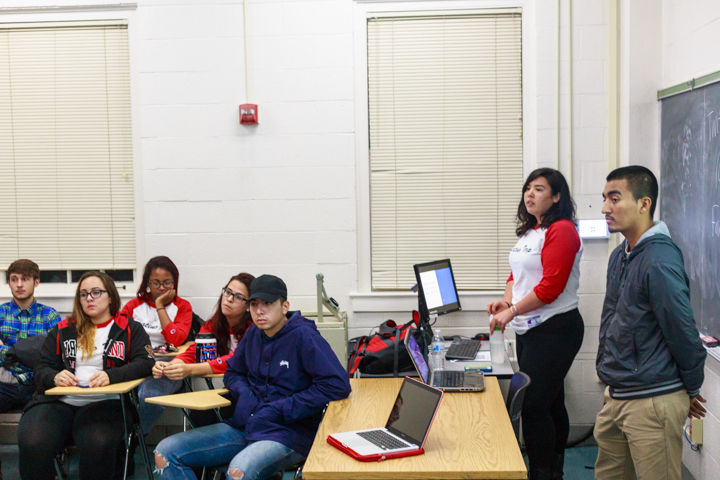
Students with the Latino Student Union discuss the problems of cultural appropriation when it comes to Halloween costumes.
After Bibiana Valdes moved to the United States from Mexico, she said, she realized Mexicans are often misrepresented.
“Not all Mexicans look the same, not all Latinos are Mexicans, and that’s something that definitely needs to be represented to society, something people should be aware of and definitely something that people need to do research on,” said Valdes, junior electrical engineering major at the University of Maryland. “Coming here and seeing that stereotype; it’s pretty hurtful.”
And with Halloween — and the parade of potentially offensive costumes that comes with it — around the corner, these stereotypes once again come to the forefront.
Valdes was one of about 20 students at this university who attended the Latino Student Union’s discussion about cultural appropriation in Halloween costumes Wednesday. The group discussed the use of blackface, dressing as Native Americans, Mexicans, Africans, Asians and other ethnic or religious groups in stereotypical ways, and women’s costumes that sexualize the aspects or attire of other cultures.
Students sat in a semi-circle in a Jimenez Hall classroom and shared their opinions about different examples of cultural costumes. The group concluded that individuals can respectfully dress as celebrities or characters of another race or ethnicity but should do their research before choosing how to dress up, educate others when their costumes are problematic and never use blackface.
LSU President Edwin Gonzalez said these costumes perpetuate harmful ways certain groups of people are often portrayed in the media. He said he hopes the media and society will move away from these portrayals.
“It’s a way of like saying, ‘Oh this is kind of like a joke, the way that they dress up,’” the junior education major said. “It’s kind of like them continuing this effort to portray certain cultures in negative ways.”
READ MORE: Microaggressions featured in UMD’s third annual Rise Above ‘-isms’ week
Beyond this event, the issue of appropriation during Halloween is a concern for other students.
Wendy Laybourn, a fourth-year doctoral student studying sociology, said cultural appropriation involves taking the artistic forms, practices, themes or other aspects of another culture and using them “divorced from their true meanings” and “without understanding the history and the implication of those actions.” Laybourn studies the representation of black men and women in hip-hop music and music videos.
While people intend their Halloween costumes to be worn for “a night of fun or comic relief or to be sexy,” dressing as Native Americans, Mexicans or other cultures reduces that group of people to an object or characterization based on stereotype, Laybourn said.
“A lot of people say, ‘Oh, it’s just in good fun,’ or ‘It’s just a joke; lighten up, like, it’s nothing serious,’” she said. But by dressing this way, “you are actually perpetuating stereotyping a group of people, you’re perpetuating racist acts or discriminatory treatment, right? … The same costumes that are just fun for you, for other people are the way they’re marked in society and a marker of differential treatment.”
READ MORE: Sexy Halloween costumes and the problems they pose
Last year, senior African American studies major Cathryn Paul said she saw a young man on a university bus dressed as a homeless person, with “messed- up clothes, missing teeth … crazy hair” and dirt on his body.
“I do a lot of volunteer work with [the] homeless in Baltimore. I know homeless people. I know their situations, and homelessness is not sexy, and it’s not something to be laughed about. It’s definitely not a joke,” Paul said. “When there’s homeless kids that don’t have the luxury of going trick-or-treating this Saturday, you have to sort of realize how disrespectful it is to make a joke of their situation and their circumstances.”
While these costumes and similar practices are often called “cultural appropriation,” Paul, service chairwoman of university political action group Community Roots, said it is more a matter of respecting other people.
“I don’t think people go and shop for Halloween costumes and intentionally say, ‘Hey I want to be offensive.’ I think they’re just looking to have fun and look cute or whatever it may be,” she said. “But just think, like, would you wear that costume around that group of people?”



